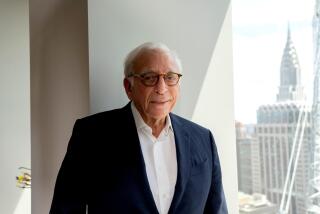Zell raps Broad for his late bid for Tribune
Billionaire investor Sam Zell said Tuesday that Los Angeles magnate Eli Broad had sought him out as a partner last month to win control of Tribune Co., then betrayed him with his own late attempt.
Zell’s remarks to the Chicago Tribune were his first public comments detailing the frantic final scramble by a bevy of billionaires for the venerable media company. Zell won the contest late Sunday when Tribune accepted his $8.2-billion bid for the company, which owns the Los Angeles Times, KTLA-TV Channel 5, the Chicago Cubs baseball team and cable TV network Superstation WGN.
Little had been known about the behind-the-scenes dealings as Tribune’s self-imposed deadline of March 31 loomed.
Zell appeared on the verge of taking the company, only to face an 11th-hour counteroffer from Broad and his partner, Los Angeles supermarket magnate Ron Burkle. The two are said to be studying their options. But Zell made his ill feelings toward Broad clear.
“If somebody calls me and says, ‘I want to be your partner,’ and the next day tries to stick a knife in my back, tell me again why I would want to do business with him,” Zell said in the interview, according to a transcript the Tribune gave to The Times.
Broad declined to comment.
Despite his displeasure with Broad, Zell sounded as if he would be willing to listen to a pitch by yet another California billionaire, media tycoon David Geffen, to take control of the company’s single largest asset, the Los Angeles Times.
The Chicago real estate tycoon said he had had dinner once with Geffen but did not know enough to express an opinion about the possibility they would partner. He called Geffen “a delightful character” but said a possible deal involving The Times was “not a question I can answer.” Geffen and Zell each own a home in Malibu.
Tribune announced Monday that it had accepted Zell’s offer for Tribune, owner of more than 30 television stations and newspapers, along with Food Network and the CareerBuilder job search website.
Zell’s deal will not be complete until it wins approval from the Federal Communications Commission, which regulates TV station licenses, and shareholders. Then the executive, who has little media background, would join with an employee stock ownership plan, or ESOP, to take over the company.
Zell, 65, told the Tribune that he was optimistic about the venture’s prospects for success, but that one key would be the company’s ability to overcome a long-running feud between management and The Times. Asked how familiar he was with the highly public dispute, Zell said, “More familiar than I’d like.”
Tribune bought the paper and its parent, Times Mirror Co., in 2000. But hoped-for synergies did not emerge and two publishers and two editors at The Times left in disputes over what they said were demands for excessive staff cuts by the corporate parent.
“I view the period since the L.A. Times [purchase] as being a period in which too much time, effort and focus have been spent on dealing with issues that had nothing to do with the running of the business,” Zell said. “I hope that our transaction puts all those issues to bed.”
Zell said he was not entirely familiar with the feud, in which Publisher Jeffrey M. Johnson and Editor Dean Baquet last year rebuffed an order to provide a list of staff cuts to their Chicago bosses.
Asked if such behavior was appropriate, Zell responded, “No. . . . Whatever the terms of the job are, he has to live by them.”
Zell said that he did not know about any current job cuts planned by Tribune and that success for his investment would hinge on growth.
“My focus is not to look at this thing and see how we can eliminate one more table leg because frankly eliminating a couple more of this or that isn’t going to make this work,” Zell said. “What’s going to make this work is raising revenue.”
The entrepreneur also said boardroom infighting had made it difficult for Tribune management, led by Chief Executive Dennis J. FitzSimons, to focus on its strategy.
“I think it would be unfair to totally judge Tribune’s management on the events of the last three or four years,” Zell said. “These external distractions were very, very difficult here and therefore dramatically impacted the ability of the company to function.”
He said he planned to stick with the current management team, to give them a chance to prove themselves. He also said he had no intention of meddling in news decisions at Tribune papers.
“Do I look naive enough to think I have any influence about what people write?” Zell said.
Despite the unsettled state of the media business and the leakage of audience and advertising to the Internet, Zell said he welcomed the challenge. He said he planned to work closely with the company’s 20,000 employees and help a team of independent directors to transition the old media company to the digital age.
“In the end, it was all about alignment of interests, and nothing else matters,” Zell said.
“I’m putting $315 million into this deal, cash. I don’t make a nickel return unless the deal is a success to the stockholders. We are tied in the pot together.”
Zell said that in one move to ensure an alignment of interests he would try to manage cooperatively with the employee stock ownership plan that will be his partner in owning the company.
More to Read
The biggest entertainment stories
Get our big stories about Hollywood, film, television, music, arts, culture and more right in your inbox as soon as they publish.
You may occasionally receive promotional content from the Los Angeles Times.











